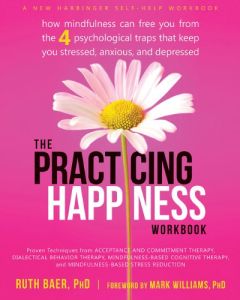
The Practicing Happiness Workbook
How Mindfulness Can Free You from the Four Psychological Traps That Keep You Stressed, Anxious, and Depressed
Recommendation
Mindfulness calls for consciously keeping your thoughts in the present. It helps you deal attentively with what’s happening around you. People who study and apply mindfulness can use it to help them overcome common psychological challenges. Ruth Baer’s straightforward text addresses pitfalls that afflict many people and detract from their overall happiness. Drawing from numerous case studies, she explains how mindfulness can boost your happiness – no matter how you define it. She explains that accepting negative emotions and addressing them with mindfulness helps you avoid the four “psychological traps” of “rumination, avoidance, emotion-driven behavior and self-criticism.” Addressing problems with mindfulness puts kindness ahead of criticism. Baer’s well-organized manual offers examples, worksheets, bullet lists, self-tests, glossaries and a helpful design that empathetically moves the reader through her lessons. getAbstract suggests it to mindfulness practitioners, to those who feel blue or dissatisfied, and to those who care about someone who’s struggling to find happiness.
Summary
About the Author
University of Kentucky psychology professor and mindfulness expert Ruth Baer edited two books for professionals: Mindfulness-Based Treatment Approaches and Assessing Mindfulness and Acceptance Processes in Clients.
















Comment on this summary